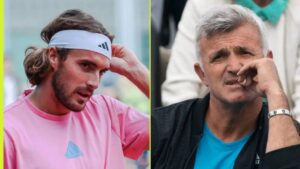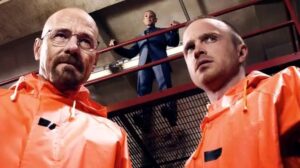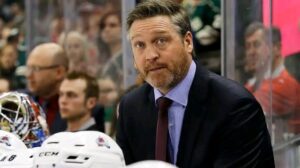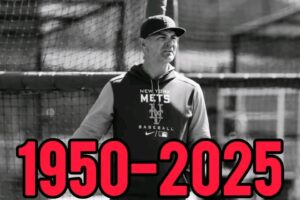
Just In: “It’s Been a Difficult Relationship,” Stefanos Tsitsipas States After Firing His Father as Coach Due to Doctor’s Report Over His Physical Condition
In a stunning and emotional announcement, Greek tennis star Stefanos Tsitsipas revealed that he has decided to part ways with his father, Apostolos Tsitsipas, as his coach, citing a combination of physical challenges and the increasingly strained nature of their relationship. The decision, which has sent shockwaves through the tennis world, marks a dramatic shift in the dynamics of one of the most high-profile father-son coaching partnerships in modern tennis.
Tsitsipas, who has been coached by his father since his early days in the sport, explained that the decision came after receiving a report from his medical team that highlighted the toll his current physical condition has been taking on his game. The report, which included assessments of his chronic injuries and physical limitations, served as a turning point for the 25-year-old as he confronted the reality of his current situation on the ATP Tour.
A Growing Physical Struggle
The decision to part ways with his father came shortly after Tsitsipas struggled with recurring injuries and a series of underwhelming performances during the 2024 season. Tsitsipas, who had previously reached the final of the Australian Open and the French Open and was widely regarded as one of the brightest talents on the men’s circuit, had been grappling with several long-term physical issues, including shoulder and back problems that have hindered his performance.
According to Tsitsipas, the doctor’s report was a wake-up call. “The medical staff have given me an honest assessment of my physical state, and it’s clear that the physical demands of the game, combined with the intense pressure I’ve been under, have reached a point where I need to rethink my approach to the game,” Tsitsipas said in a candid press conference. “This is not just about tennis anymore; it’s about my health and my future in the sport.”
The report, which was compiled after a series of scans and tests, indicated that Tsitsipas’ injuries were not improving despite various treatments. In particular, concerns over the long-term impact of his back issues were at the forefront, with doctors suggesting that Tsitsipas may need to make changes to his playing style and physical regimen to prevent more serious damage.
Strained Father-Son Relationship
In addition to the physical challenges, Tsitsipas opened up about the difficulties he had been facing in his personal relationship with his father, which had been impacting his ability to compete at the highest level. The father-son coaching dynamic, which had been a hallmark of Tsitsipas’ rise to prominence, had come under increasing strain in recent years. Tsitsipas admitted that the pressure of being coached by a family member, combined with his physical struggles, had taken a mental toll.
“It’s been a difficult relationship, especially in the last couple of years,” Tsitsipas explained. “We’ve had moments of tension, and while I respect everything my father has done for me, I’ve come to realize that our relationship has become more about managing pressures than enjoying the sport together. The constant back-and-forth and the stress have affected both of us.”
Tsitsipas revealed that there had been moments when the tension between them had spilled over into their professional life, with the lines between father and coach blurring. “I don’t want to lose my father as a person, but I also realize that in order to continue growing and developing as a player, I need to take a step back and reassess my coaching team and my support system,” he said.
The End of an Era
The decision to part ways with his father is particularly poignant given their history together. Apostolos Tsitsipas had been Stefanos’ first coach and had been instrumental in shaping his early career. The father was known for his intense, often demanding approach, and was a constant presence in his son’s rise to the upper echelons of the sport. Their close bond and unique partnership became a symbol of dedication and family loyalty, and many in the tennis world admired the way they worked together.
However, as Tsitsipas grew older and more successful, the challenges of working so closely with a family member began to take their toll. The pressure of living up to expectations, coupled with the added stress of family dynamics, began to overshadow the positives of their relationship. Tsitsipas’ performances in recent major tournaments, combined with his increasing physical struggles, made it clear that change was needed.
“It’s never easy to make a decision like this,” Tsitsipas admitted. “But at this point in my career, I need to make changes that are in the best interest of both my health and my tennis future. I will forever be grateful to my father for everything he’s done, and this decision is not about rejecting him, but rather about moving forward in a way that helps me grow as a player.”
Looking Ahead
Moving forward, Tsitsipas indicated that he would be seeking a new direction in his coaching career. While he did not announce any immediate replacements, he expressed his intent to explore a new training environment that would be better suited to his evolving needs as an athlete. “I’m looking for a coach who can help me navigate these next steps in my career, someone who can challenge me in new ways and help me take my game to the next level,” Tsitsipas stated.
The tennis world will now watch closely to see how Tsitsipas adapts to this new chapter in his career. Whether he can overcome the physical and mental challenges that have been holding him back will depend on his ability to find the right balance, both in terms of his coaching team and his approach to training. One thing is clear: Tsitsipas is at a crossroads, and the decisions he makes over the coming months will have a significant impact on his future in the sport.
As for his relationship with his father, Tsitsipas remained optimistic. “I know my father will always be there for me, and I hope we can continue to support each other in different ways,” he said. “This is just a part of growing up, both as a person and as a professional athlete.”






